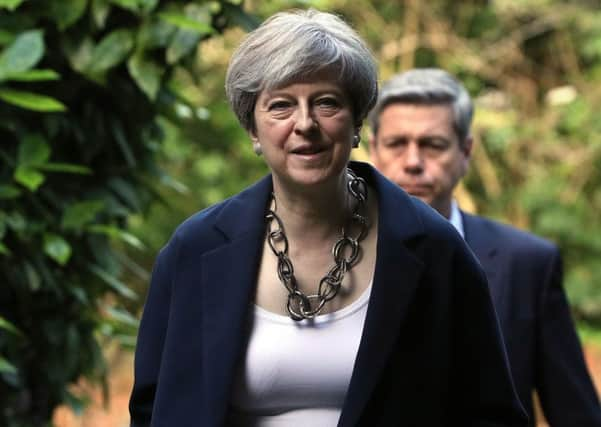Chris Burn: Saboteur in No 10 left surveying the Brexit wreckage


Theresa May’s dire miscalculation to call an unneeded general election, and the hung Parliament that resulted from an appalling and arrogant campaign, has left the nation in an impossible position.
Mrs May is now a politician damned by her own words. She called an election in April, little more than a month after the Bill to trigger Article 50 was passed by Parliament without a single word being amended. She was essentially in an unopposed position to enter Brexit talks on the basis of her plan for the UK to leave the single market, scrap EU laws and end free movement.
Advertisement
Hide AdAdvertisement
Hide AdBut as she stood outside Downing Street on April 18 to announce the snap election, she uttered these unintentionally prescient words: “Division in Westminster will risk our ability to make a success of Brexit and it will cause damaging uncertainty and instability to the country.”
That precise situation has now come to pass and there seems little way out of the mess that has been created either for the Conservative Party or, by extension, the country it leads (in theory, at least).
Option A, another general election, causes more uncertainty and wastes further months before Brexit negotiations can begin in earnest as the two-year deadline triggered by Mrs May ticks down.
Option B, a navel-gazing Conservative Party contest to replace Mrs May as Prime Minister, would also cause uncertainty, again delaying Brexit negotiations as rival candidates put forward their different visions of how the country’s future would look and result in another publicly unelected leader in charge of the country – leading to inevitable calls for that new leader to go back to Option A, calling another general election.
Advertisement
Hide AdAdvertisement
Hide AdOption C, Mrs May resigning and a new leader being chosen unopposed, leads inevitably again back to Option A.
That leaves the current reality that is Option D – an enfeebled Mrs May stripped of her trusted key advisers remaining as Prime Minister and running a government reliant on the support of the Democratic Unionist Party to achieve any of its policy objectives. Even putting aside DUP views on abortion, gay rights and climate change that repulse vast swathes of the voting public, this dangerous state of affairs clearly puts the Good Friday Agreement at risk.
The 1998 accord commits the British and Irish governments to demonstrating “rigorous impartiality” over differing political traditions in Northern Ireland. But Irish PM Enda Kenny has already indicated his concerns about the Conservatives’ ability to adhere to such a commitment if they are wedded to a parliamentary alliance with the DUP.
The stakes are raised even higher by the fact that talks to save the crisis-hit power-sharing arrangements in Northern Ireland are resuming this week. That crisis was triggered by the DUP’s involvement in a botched energy scheme that has landed taxpayers with an estimated bill of more than £400m.
Advertisement
Hide AdAdvertisement
Hide AdIn this context, it is worth returning again to Mrs May’s speech of April 18. The election, she said, was “all about leadership”. The country could not risk “weak and unstable coalition Government” that would “reopen the divisions of the referendum”.
But after refusing to take part in a debate with Jeremy Corbyn, persistently failing to answers questions beyond giving pre-prepared sound bites and avoiding encounters with the general public, the result of the election called by Mrs May has done almost exactly that.
From a country that had largely resolved to accept the result of last year’s referendum, old wounds have now been reopened.
On election night, George Osborne said Mrs May’s Brexit plans were in the “rubbish bin”; Remain campaigner Gina Miller claimed cross-party support would now be needed for a deal with the EU; and Nigel Farage warned “they will be cheering in Brussels” at “the chance to crush a real Brexit”.
Advertisement
Hide AdAdvertisement
Hide AdWhatever the truth of those statements, the fact is Mrs May’s personal credibility has been shredded as the country heads towards the EU negotiations that will determine all of our futures for years to come.
No one can confidently predict what happens next but it is unlikely to be pretty.
“Crush the saboteurs” was the controversial Daily Mail headline the day after Mrs May called the election. The extraordinary reality is that no Remain “saboteur” could have done as much damage to a successful Brexit resolution for the UK than the Prime Minister herself.
Chris Burn is a Yorkshire Post features writer